|
|
|
Sort Order |
|
|
|
Items / Page
|
|
|
|
|
|
|
| Srl | Item |
| 1 |
ID:
146253
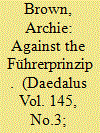

|
|
|
|
|
| Summary/Abstract |
The Führerprinzip has not been confined to Nazi Germany. The cult of the strong leader thrives in many authoritarian regimes and has its echoes even in contemporary democracies. The belief that the more power a president or prime minister wields the more we should be impressed by that politician is a dangerous fallacy. In authoritarian regimes, a more collective leadership is a lesser evil than personal dictatorship. In countries moving from authoritarian rule to democracy, collegial, inclusive, and collective leadership is more conducive to successful transition than great concentration of power in the hands of one individual at the top of the hierarchy. Democracies also benefit from a government led by a team in which there is no obsequiousness or hesitation in contradicting the top leader. Wise decisions are less likely to be forthcoming when one person can predetermine the outcome of a meeting or foreclose the discussion by pulling rank.
|
|
|
|
|
|
|
|
|
|
|
|
|
|
|
|
| 2 |
ID:
119420


|
|
|
|
|
| Publication |
2013.
|
| Summary/Abstract |
On 10 June 2000, a group of roughly 200 mourners assembled at the Zentralfriedhof Berlin-Friedrichsfelde, the traditional resting place for those belonging to Germany's Communist pantheon beginning with Rosa Luxemburg and Karl Liebknecht. The occasion was the burial of Erich Mielke, the longstanding head of East Germany's Ministerium für Staatssicherheit (Ministry of State Security; MfS or Stasi) who had died the previous month of natural causes at the age of 92. Willi Opitz, the last rector of the MfS Juristische Hochschule (School of Law), headed the delegation and delivered the main eulogy. In the course of Opitz's remarks, Mielke was praised for his "energetic preservation and assertion of socialist law not only in our ministry but in all areas of state and society." In addition to his desire that "people live and work in security and dignity," he himself "radiated optimism, strength, and zest for life." Even after 1989-confronted by "prejudices based in revenge and victors' justice, degrading penal conditions, [and] the revocation of his entitlement to a VVN (Association of Victims of the Nazi Regime) pension"-Mielke remained unbroken. A few words of consolation were also directed at his widow, his son Frank, his adopted daughter Inge, and his two grandchildren, all in attendance.
|
|
|
|
|
|
|
|
|
|
|
|
|
|
|
|
| 3 |
ID:
098357
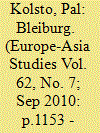

|
|
|
|
|
| Publication |
2010.
|
| Summary/Abstract |
In a study of historical myths in South Eastern Europe in 2005 I identified four different types of mythologies, one of which was the myth of martyrdom (Kolsto 2005). I pointed out that while nations most of the time celebrate their victories and moments of glory, occasionally their great tragedies and defeats are also embellished into mythical stories and made into objects of collective commemoration. As a prime example of mythologised defeats in the history of the Balkan peoples I-like many other authors-singled out the battle of Kosovo in 1389, an event which in contemporary Serbian consciousness has come to be regarded as the moment when the Serb nation chose righteousness and truth over earthly power (Vuchinich & Emmert 1991; Anzulovic 1999, pp. 11-22; Judah 2000).
|
|
|
|
|
|
|
|
|
|
|
|
|
|
|
|
| 4 |
ID:
127542
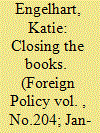

|
|
|
| 5 |
ID:
105843
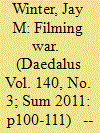

|
|
|
| 6 |
ID:
191084
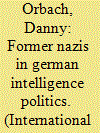

|
|
|
|
|
| Summary/Abstract |
The early history of the postwar West German foreign intelligence service is replete with accounts of former Nazi security officers who were recruited by the newly founded service thanks to their professional experience, connections, and anti-Soviet credentials, only to later be exposed as Soviet moles. Focusing on the case of Heinz Felfe, this article puts forward the argument that the reaction of a secret service to the impending exposure of moles can be even more harmful than their actual activity. Enemy moles in intelligence organizations are dangerous in more than one way. They cause damage, of course, when they operate in the dark, but also cause just as much, and even more, damage when exposed. The fear of public scandal incentivizes irrational behavior, aggravating rather than decreasing the dangers facing the service.
|
|
|
|
|
|
|
|
|
|
|
|
|
|
|
|
| 7 |
ID:
100188


|
|
|
|
|
| Publication |
2010.
|
| Summary/Abstract |
THE DOCUMENTS from the RF Foreign Ministry Historical Documents Department made public for the first time relate to one of the little-known pages of the Great Patriotic War. According to the documents, the 70th Army of the 2nd Byelorussian Front under Marshal Konstantin Rokossovsky seized the town of Prenzlau on April 27, 1945 during the course of the Berlin operation. Later in the day the army freed the inmates of the concentration camp, a short way from the town. Among the POWs were 2,311 officers of the Belgian army, including 33 generals.
|
|
|
|
|
|
|
|
|
|
|
|
|
|
|
|
| 8 |
ID:
096051
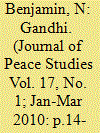

|
|
|
| 9 |
ID:
034849
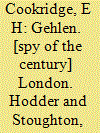

|
|
|
|
|
| Publication |
London, Hodder and Stoughton, 1971.
|
| Description |
xxii, 402p.Hbk
|
|
|
|
|
|
|
|
|
|
|
|
Copies: C:1/I:0,R:0,Q:0
Circulation
| Accession# | Call# | Current Location | Status | Policy | Location |
| 009625 | 923.532712/COO 009625 | Main | On Shelf | General | |
|
|
|
|
| 10 |
ID:
128801
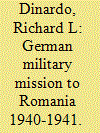

|
|
|
| 11 |
ID:
032492


|
|
I R A
/ Coogan, Tim Pat
|
1970

|
|
|
|
| Publication |
London, Pall Mall Press, 1970.
|
| Description |
x, 373p.: ill.Hbk
|
| Standard Number |
0269027750
|
|
|
|
|
|
|
|
|
|
|
|
Copies: C:1/I:0,R:0,Q:0
Circulation
| Accession# | Call# | Current Location | Status | Policy | Location |
| 007747 | 941.7/COO 007747 | Main | On Shelf | General | |
|
|
|
|
| 12 |
ID:
100187
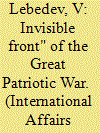

|
|
|
|
|
| Publication |
2010.
|
| Summary/Abstract |
HE TRAGIC DAY for the entire Soviet people - June 22, 1941 - radically changed the operation of all foreign intelligence. The Edict of the Presidium of the USSR Supreme Soviet of July 20 merged the People's Commissariat for Interior Affairs (NKVD) and People Commissariat for National Security (NKGB) to form a single entity - the NKVD in order to concentrate the resources of state security agencies during wartime. The Fifth (Foreign) Directorate of the Main Directorate of State Security (GUGB) was reorganized into the First Directorate of the NKVD. Shortly before the war it had a staff of 700, ran 40 intelligence stations abroad with some 240 intelligence officers. The latter were connected to over 600 agents.
|
|
|
|
|
|
|
|
|
|
|
|
|
|
|
|
| 13 |
ID:
038618
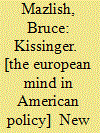

|
|
|
|
|
| Publication |
New York, Basic Books, Inc., Publishers, 1976.
|
| Description |
xiii, 330p.Hbk
|
| Standard Number |
0465037275
|
|
|
|
|
|
|
|
|
|
|
|
Copies: C:1/I:0,R:0,Q:0
Circulation
| Accession# | Call# | Current Location | Status | Policy | Location |
| 017057 | 923.273/MAZ 017057 | Main | On Shelf | General | |
|
|
|
|
| 14 |
ID:
066977
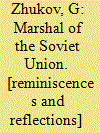

|
|
|
|
|
| Publication |
Moscow, Progress Publishers, 1985.
|
| Description |
454p.Hbk
|
|
|
|
|
|
|
|
|
|
|
|
Copies: C:2/I:0,R:0,Q:0
Circulation
| Accession# | Call# | Current Location | Status | Policy | Location |
| 027014 | 923.547/ZHU 027014 | Main | On Shelf | General | |
| 027015 | 923.547/ZHU 027015 | Main | On Shelf | General | |
|
|
|
|
| 15 |
ID:
045308
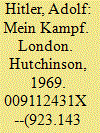

|
|
|
|
|
| Publication |
London, Hutchinson, 1969.
|
| Description |
xlviii, 629p.Pbk
|
| Standard Number |
009112431X
|
|
|
|
|
|
|
|
|
|
|
|
Copies: C:1/I:0,R:0,Q:0
Circulation
| Accession# | Call# | Current Location | Status | Policy | Location |
| 025024 | 923.143/HIT 025024 | Main | On Shelf | General | |
|
|
|
|
| 16 |
ID:
042127
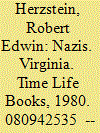

|
|
Nazis
/ Herzstein, Robert Edwin
|
1980

|
|
|
|
| Publication |
Virginia, Time Life Books, 1980.
|
| Description |
208p.Hbk
|
| Standard Number |
080942535
|
|
|
|
|
|
|
|
|
|
|
|
Copies: C:1/I:0,R:0,Q:0
Circulation
| Accession# | Call# | Current Location | Status | Policy | Location |
| 019277 | 940.5343/HER 019277 | Main | On Shelf | General | |
|
|
|
|
| 17 |
ID:
105244
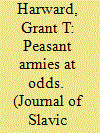

|
|
|
|
|
| Publication |
2011.
|
| Summary/Abstract |
The battle on the Eastern Front is usually depicted as simply a clash between Nazi Germany and the Soviet Union. However, a multitude of nations joined the Axis on the Eastern Front. Of all these nations, Romania was the most important ally of the Wehrmacht. The depth of Romania's alliance with Nazi Germany has just begun to be explored in the last two decades, but examination of the relationship between the Romanian Army and the Red Army during the war is still almost non-existent. This is particularly troubling when it is taken into account that the Romanian Army eventually fought alongside the Red Army in the last year of the war. This article explores the evolution of Romanian-Soviet interaction from enemies to allies.
|
|
|
|
|
|
|
|
|
|
|
|
|
|
|
|
| 18 |
ID:
118815
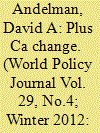

|
|
|
|
|
| Publication |
2012.
|
| Summary/Abstract |
Paris-The first meal I ever had in France was in a small bistro on the rue de Caumartin just down the street from No. 37-the office that served for half a century as the Paris bureau of The New York Times. It was to this bureau that Timesmen returned as the Allies re-took Paris at the end of World War II, astonished that it was still much as they'd left it when the Nazis had first rolled into town. As for myself, my arrival took place a quarter-century later-September 7, 1969. I'd just touched down in Paris, for my first visit, on an Air India flight from New York. When I exited the subway at the Havre-Caumartin stop, the streets were as quiet as central Paris can only get on a lazy Sunday afternoon, barely a week after "le grand retour" brought the hordes back from their August vacances to the real world. The Times' bureau was shifting into high gear, churning out copy for the next day's editions. My new boss, Seymour Topping, then foreign editor, had warned bureau chief Henry Tanner that his news assistant would be pitching up there and to treat him right. So with Tanner's door closed as he crafted his story, the curmudgeonly reporter John Hess suggested I duck down the block to a little bistro and have a bite until Tanner was free to begin the process of inculcating me in the French way of life. So I did. I ordered "un hot dog" and was taken aback as they served me a long, grilled dog smothered with melted cheese. Not likely something they'd have served up at Fenway Park.
|
|
|
|
|
|
|
|
|
|
|
|
|
|
|
|
| 19 |
ID:
127358
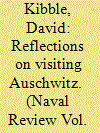

|
|
|
| 20 |
ID:
038566
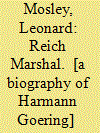

|
|
|
|
|
| Publication |
London, WeidenFeld and Nicolson, 1974.
|
| Description |
xi, 394pHbk
|
| Standard Number |
0297768107
|
|
|
|
|
|
|
|
|
|
|
|
Copies: C:1/I:0,R:0,Q:0
Circulation
| Accession# | Call# | Current Location | Status | Policy | Location |
| 014355 | 923.543/MOS 014355 | Main | On Shelf | General | |
|
|
|
|
|
|
|
|
|